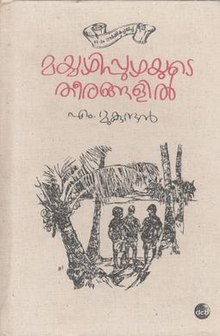
Puducherry, also known as Pondicherry, is a union territory of India, consisting of four small geographically unconnected districts. It was formed out of four territories of former French India, namely Pondichéry, Karikal (Karaikal), Mahé and Yanaon, excluding Chandannagar (Chandernagore), and it is named after the largest district, Puducherry, which was also the capital of French India. Historically known as Pondicherry, the territory changed its official name to Puducherry on 1 October 2006.

Malayalam, the lingua franca of the Indian state of Kerala and the union territories of Lakshadweep and Puduchery, is one of the six classical languages of India. Malayalam literature comprises those literary texts written in Malayalam, a South-Dravidian language spoken in the Indian state of Kerala. The first travelogue in any Indian language is the Malayalam Varthamanappusthakam, written by Paremmakkal Thoma Kathanar in 1785. Malayalam literature has been presented with 6 Jnanapith awards, the second-most for any Dravidian language and the third-highest for any Indian language.
Mahe also known as Mayyazhi, is a small town in the Mahe district of the Puducherry Union Territory. It is situated at the mouth of the Mahe River and is surrounded by the State of Kerala. The Kannur district surrounds Mahe on three sides and Kozhikode district from one side.

Ottapalam is a town, taluk and municipality in the Palakkad District, Kerala, India. It is the administrative headquarters of the Ottapalam taluk. Ottapalam is located about 34 km (21 mi) from district headquarters Palakkad. Ottapalam is located along the banks of Bharathapuzha, second longest river of the state.

Thalassery, formerly Tellicherry, is a municipality and commercial city on the Malabar Coast in Kannur district in the state of Kerala, India, bordered by the districts of Mahe, Kozhikode, Wayanad, Kasaragod and Kodagu (Karnataka). Thalassery municipality has a population of just under 100,000 as of 2011 census. Thalassery Heritage City has an area of 23.98 square kilometres (9.26 sq mi). Thalassery has an altitude ranging from 2.5 to 30 metres above mean sea-level.

N. S. Madhavan is an Indian writer of Malayalam literature. Known for his novel, Lanthan Batheriyile Luthiniyakal and a host of short stories such as Higuita, Thiruthu, Chulaimedile Shavangal and Vanmarangal Veezhumpol, Madhavan also writes football columns and travel articles. He is a distinguished fellow of Kerala Sahitya Akademi and a recipient of several major awards including Odakkuzhal Award, Kerala Sahitya Akademi Award for Story, Kerala Sahitya Akademi Award for Novel, Muttathu Varkey Award, Mathrubhumi Literary Award, Crossword Book Award and Kerala State Students Federation Sahithyolsav Award.
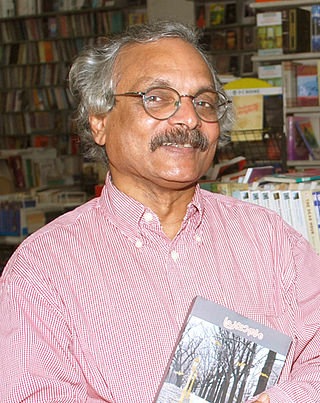
Maniyambath Mukundan is an Indian author of Malayalam literature and former diplomat. He worked as a cultural attaché at the Embassy of France in Delhi from 1961 to 2004, while concurrently working as an author. Many of his early works are set in Mahe (Mayyazhi), his homeland, which earned him the moniker Mayyazhiyude Kathakaaran. He is known to be one of the pioneers of modernity in Malayalam literature. Some of his best known works include Mayyazhippuzhayude Theerangalil, Daivathinte Vikrithikal, Kesavante Vilapangal, and Pravasam.

Pondicherry is the capital and most populous city of the Union Territory of Puducherry in India. The city is in the Puducherry district on the southeast coast of India and is surrounded by the Bay of Bengal to the east and the state of Tamil Nadu, with which it shares most of its culture, heritage, and language.
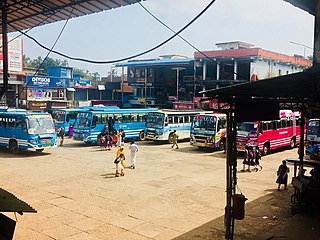
Nadapuram is a census town and a special grade Panchayath located in Kozhikode District of Kerala, coming under Nadapuram assembly constituency. It is in North Malabar region of Kerala, India; spread over an area of 20.44 km2

The Mahe River (Mayyazhipuzha) is a river in South India. It flows through the state of Kerala and the coastal exclave of Mahe in Puducherry.
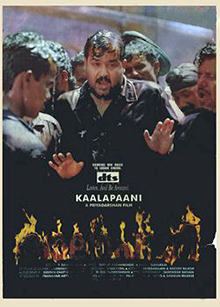
Kaalapaani is a 1996 Indian Malayalam-language epic historical drama film written by T. Damodaran and directed by Priyadarshan. Set in 1915, the film focuses on the lives of Indian independence activists incarcerated in the Cellular Jail in Andaman and Nicobar Islands during the British Raj. The ensemble cast includes Mohanlal, Prabhu, Tabu, Amrish Puri, Nedumudi Venu, Sreenivasan, Tinnu Anand, Annu Kapoor, Alex Draper, Sankaradi, and Vineeth. The film was produced by Mohanlal for Pranavam Arts in association with R. Mohan's Shogun Films.
Irayi Kunnathidathil Kumaran Master, was a freedom fighter from Mahe or Mayyazhi, Union territory of India, who fought for liberation from France, in 1954. He also unsuccessfully fought for the unification of Mayyazhi with Kerala. He is known as "Mahe Gandhi". Kumaran was the first Administrator of Mahe after Indian independence.
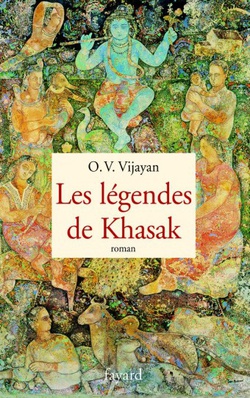
Khasakkinte Itihasam is the Malayalam debut novel by Indian writer O. V. Vijayan (1930–2005). It was first serialised in 1968 and published as a single edition in 1969. The novel has been translated from Malayalam into French by Dominique Vitalyos.
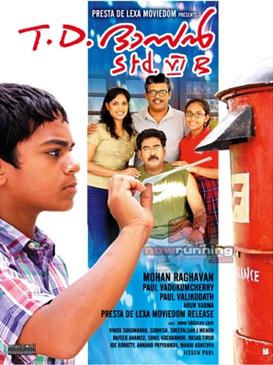
T. D. Dasan Std. VI B is a 2010 Indian Malayalam-language film written and directed by Mohan Raghavan and produced by Paul Vadukumcherry. The film deals with a child's desire to see his father, and the beginning is made when he gets a clue from a piece of paper he finds in his mother's trunk. The wanderings of the boy's mind and the real unravel of world which is a mix of dreams, desires and the present are portrayed in the movie.

Unnikrishnan Mukundan Nair is an Indian actor, producer, singer, lyricist and social issues responder who predominantly works in Malayalam cinema, along with few Telugu and Tamil films. In 2021, he won his first national award as a producer for his production debut film, Meppadiyan, which won the national award for the best film of a debut director.
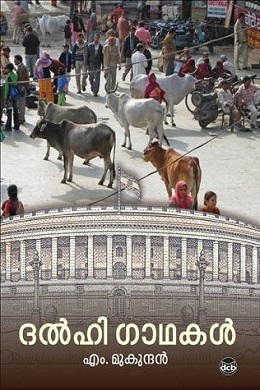
Delhi Gadhakal is a Malayalam language novel by M. Mukundan. It was first published as a book by D. C. Books in November 2011. The novel portrays the various events that greatly influenced the author's life during the 40 years spent in New Delhi, since 1962. The novel has as protagonist a leftist Kerala youth, named Sahadevan, who had the shock of his life when he landed in Delhi to hear the news of Chinese attack on India. It was translated from Malayalam by Fathima E. V. and Nandakumar K. under the title Delhi: A Soliloquy.

Samrajyam II: Son of Alexander is a 2015 Indian Malayalam-language action film directed by Perarasu in his Malayalam debut. The film is produced by Ajmal Hassan. It is a sequel to 1990 Malayalam cult classic film Samrajyam which stars Mammootty in the lead. Unni Mukundan played the lead role of Jordan, the son of Alexander who was the protagonist in the prequel. Akanksha Puri plays the female lead role. The film was partially reshot in Tamil as Tihar.
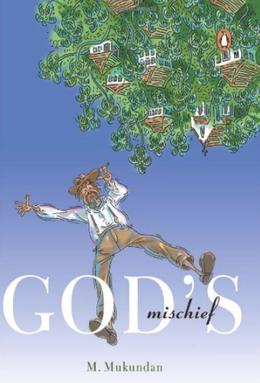
God's Mischief is a 1989 Malayalam novel written by M. Mukundan. Like most of Mukundan's works, this novel too is based in Mayyazhi, better known once as Mahé, the French colony after it was decolonised. The story centres on a magician, Father Alfonso, his daughter, Elsee and an Ayurveda Vaidyar Kumaran and his two twin sons and how their life changes after the land is decolonised. The novel won the Kendra Sahitya Akademi Award and the N. V. Prize. It was adapted into a film by noted director Lenin Rajendran in 1992.
Kesavan's Lamentations is a 1999 Malayalam novel written by M. Mukundan. The novel tells the story of a writer Kesavan who writes a novel on a child named Appukkuttan who grows under the influence of E. M. S. Namboodiripad.
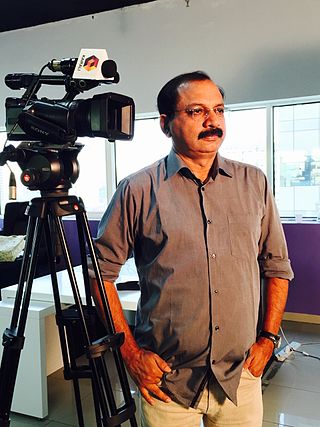
E. M. Ashraf is a Malayalam writer, film critic and Journalist. He is currently the director of Middle East, Kairali TV. He has written numerous books and articles in Malayalam language, most notably the biographies of veteran Malayalam writers Vaikom Muhammad Basheer and Sukumar Azhikode. His interview with late Indian painter M. F. Husain was published in Malayalam and later translated into Arabic and English.
